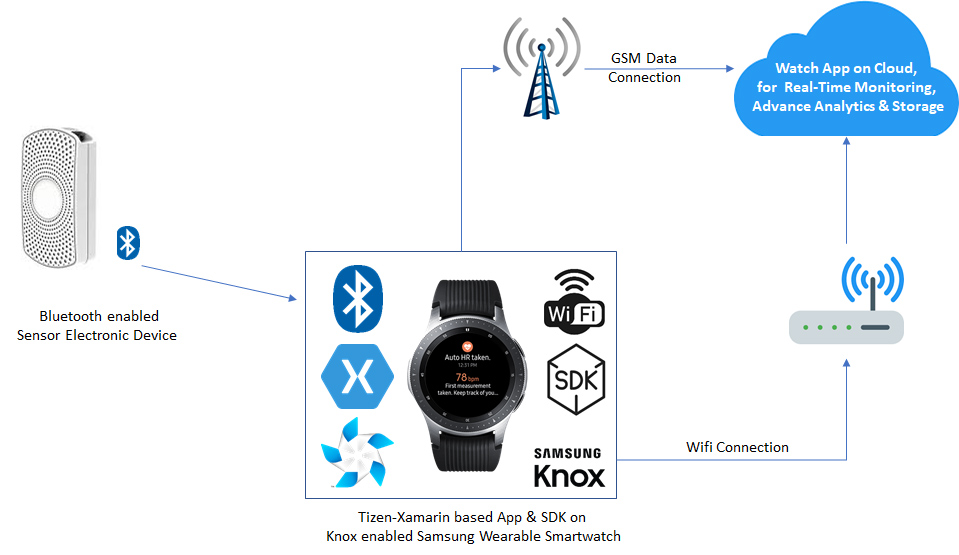Today measuring the ‘vitals’ or the vital health parameters in humans is quite advanced with all modern hospitals equipped with high-end gadgets for the same, but we haven’t really come in the age of Star Trek where one common wireless diagnostic gadget or scanner can easily scan and give all the needed information to the doctors and nurses in real time.
Some Start-ups are now moving towards this by building sensor technology which has clinical grade data quality. It can gather various human body & other parameters and process them for making sure there is no ‘noise data’. It is then transmitted wirelessly to their backend systems for use cases like advanced analytics, real-time monitoring, etc.
With use cases in Military Training, Fire Fighting, Pharma based Clinical trials, Industrial Safety & Hazardous Workplace safety, the technology, both software and hardware, from these new-age solutions is battle-hardened and of military grade.
About the client
The leading mobile human data capture solutions provider develops products that empower individuals and teams, save lives and improve human performance through the application of mobile human data.
In the Wearable Apps Ecosystem of Hardware & Software, there are four major components - Sensors, Communication, Software Apps & Database. Right integration of these four components is crucial for the entire ecosystem to work flawlessly and give the designed benefits. So, it is imperative to also have multiple integration options available for these components of the ecosystem. So that different kinds of sensors can work with different kinds of communication protocols, which in turn can work with different types of application platforms and databases.
The critical challenges
One of the most important parts in this ecosystem’s integration is the Software Development Kit (SDK). It receives the data from the sensors and makes the data ready for apps and storage. This SDK is in a way the secret sauce behind the usability of the data collected by the sensors. Such SDKs need to be developed for both Java & Dotnet platforms. This enables anyone using Android or Windows to build apps very easily by integrating the available SDK.
Smartwatches today are really powerful devices with most of the crucial communications and app functions available similar to the Smartphone, albeit in a small form factor and being even more portable than Smartphones. Building smart watch & wearable apps need rich Enterprise Mobility & IoT know-how, along with experience with Bluetooth stack, Hardware sensory devices, Telemetry data & Xamarin cross-platform App development framework.
The client wanted to monitor the health metrics of critical life-saver personnel in real-time, which was not possible via a traditional mobile application in many situations where fire-fighters and excavators were operating in hazardous or remote situations.
The Samsung Wearable Smartwatch App Solution
The overall Smartwatch solutions built by our project teams are divided in two parts - an SDK to handle the incoming data from the sensor module & pushing it to the Cloud platform. The other part is a Smartwatch App showcasing various parameters and settings to the Smartwatch user.
For a specific Samsung Wearable Smartwatch App use case, an important decision was taken by the teams to use Xamarin App development framework. As the watch itself works on Tizen Operating system, which is developed by Samsung specifically for its wearable devices. Instead of doing native Tizen OS based development, our teams chose Xamarin due to high reusability of code available in the Dotnet SDKs. And, also due to the friendliness of C# coding language for initial development and long-term maintenance of the code.
 Samsung Wearable Smartwatch App solution architecture diagram
Samsung Wearable Smartwatch App solution architecture diagram
Other aspects which needs thinking through deeply during the plan phase itself is of UI/UX specifically for the Smartwatch’s non-functional requirements like Battery usage & Security. On the UI/UX front, it was important to consider different end use cases and develop the ‘Watch Faces’ accordingly, for example, users may require a high-contrast theme which can be more beneficial under Sun light.
Battery usage is another important factor to consider during planning the overall low-level architecture of the code. As Smartwatches have smaller battery size the code needs to be very efficient on the Power usage side by keeping the CPU and Memory usage to the minimum while still processing all the required data in the background.
Samsung Knox security platform is utilized to completely lockdown the Smartwatch and enable custom functionalities, which are generally not available in the consumer grade Samsung Smartwatches. On the Samsung Knox side there is good amount of development & configuration required for utilizing the Knox SDK and the Knox portal to enable all the use cases.
The most crucial & challenging part of the Smart Watch App solution is the development of always running Tizen background service, which enables real time data communication between Bluetooth and Sensor module on one hand; and with GSM/Wifi & the Internet based Cloud Platform APIs on the other hand. Such Wearable Smart Watch App solutions enable Physiological & Vitals monitoring, Connected Health and Mobile human monitoring across hazardous industries like Mining, Oil Rigs and Government Agencies like Military.